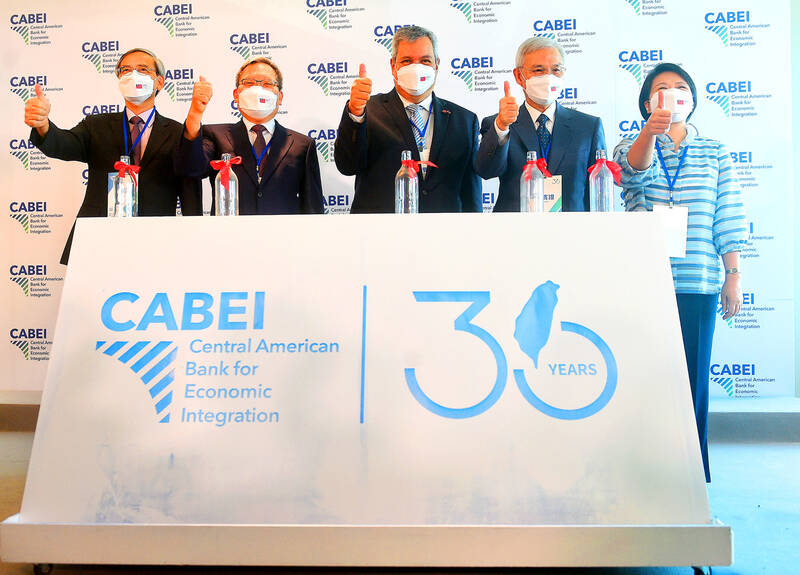Central American Bank for Economic Integration (CABEI) executive president Dante Mossi thanked Taiwan for its contribution to the region after Nicaragua proposed replacing Taiwan with China in the Central American Parliament (PARLACEN).
Then-PARLACEN president Guillermo Daniel Ortega Reyes of Nicaragua in April last year issued a statement that had not been discussed by the parliament, saying there was only “one China.”
Nicaragua last month proposed replacing the Legislative Yuan with the Chinese National People’s Congress as an observer in PARLACEN.

Photo: Chang Chia-ming, Taipei Times
Five of the six PARLACEN member states — the Dominican Republic, El Salvador, Honduras Nicaragua and Panama — recognize the People’s Republic of China as the sole representative of China, the proposal said.
Guatemala is the only PARLACEN member state that has diplomatic relations with Taiwan.
The proposal was submitted to PARLACEN’s Commission of International Relations and Migration Affairs and is to be deliberated when the parliament convenes next month.
PARLACEN adopts majority rule, which is unfavorable for Taiwan, a person familiar with the matter said, asking to remain anonymous.
Taiwan is striving to explain the nation’s contribution to the region to the parliament’s representatives and has maintained communication with them, the person said, adding that the statement issued by Nicaragua last year sparked a backlash from several representatives.
The System of Central American Integration (SICA) comprises PARLACEN, the CABEI and the Central American Common Market.
If the proposal to replace Taiwan is pushed through, some are worried that Taiwan’s observer status in SICA and its non-regional membership in the CABEI might be challenged next.
Mossi wrote on LinkedIn that Taiwan is the largest shareholder of the CABEI and “its impact in the region dwarfs any trade impact from any other country in Asia.”
A research paper conducted by the CABEI shows that none of the eight Central American countries had any significant gain with trade or investments after establishing diplomatic ties with China, he said, adding that an exception might be Panama because of trade through the Panama Canal.
“We are too far from Asia, and the size of Central America is not that attractive to the mammoths in Asia,” he said.
The CABEI has provided more than US$16 billion in loans over the past four years, of which Taiwan holds an almost 11 percent share, he said.
“For that, many thanks! Xie Xie,” he wrote.

Taiwan has received more than US$70 million in royalties as of the end of last year from developing the F-16V jet as countries worldwide purchase or upgrade to this popular model, government and military officials said on Saturday. Taiwan funded the development of the F-16V jet and ended up the sole investor as other countries withdrew from the program. Now the F-16V is increasingly popular and countries must pay Taiwan a percentage in royalties when they purchase new F-16V aircraft or upgrade older F-16 models. The next five years are expected to be the peak for these royalties, with Taiwan potentially earning

STAY IN YOUR LANE: As the US and Israel attack Iran, the ministry has warned China not to overstep by including Taiwanese citizens in its evacuation orders The Ministry of Foreign Affairs (MOFA) yesterday rebuked a statement by China’s embassy in Israel that it would evacuate Taiwanese holders of Chinese travel documents from Israel amid the latter’s escalating conflict with Iran. Tensions have risen across the Middle East in the wake of US and Israeli airstrikes on Iran beginning Saturday. China subsequently issued an evacuation notice for its citizens. In a news release, the Chinese embassy in Israel said holders of “Taiwan compatriot permits (台胞證)” issued to Taiwanese nationals by Chinese authorities for travel to China — could register for evacuation to Egypt. In Taipei, the ministry yesterday said Taiwan

Taiwan is awaiting official notification from the US regarding the status of the Agreement on Reciprocal Trade (ART) after the US Supreme Court ruled US President Donald Trump's global tariffs unconstitutional. Speaking to reporters before a legislative hearing today, Premier Cho Jung-tai (卓榮泰) said that Taiwan's negotiation team remains focused on ensuring that the bilateral trade deal remains intact despite the legal challenge to Trump's tariff policy. "The US has pledged to notify its trade partners once the subsequent administrative and legal processes are finalized, and that certainly includes Taiwan," Cho said when asked about opposition parties’ doubts that the ART was

If China chose to invade Taiwan tomorrow, it would only have to sever three undersea fiber-optic cable clusters to cause a data blackout, Jason Hsu (許毓仁), a senior fellow at the Hudson Institute and former Chinese Nationalist Party (KMT) legislator, told a US security panel yesterday. In a Taiwan contingency, cable disruption would be one of the earliest preinvasion actions and the signal that escalation had begun, he said, adding that Taiwan’s current cable repair capabilities are insufficient. The US-China Economic and Security Review Commission (USCC) yesterday held a hearing on US-China Competition Under the Sea, with Hsu speaking on